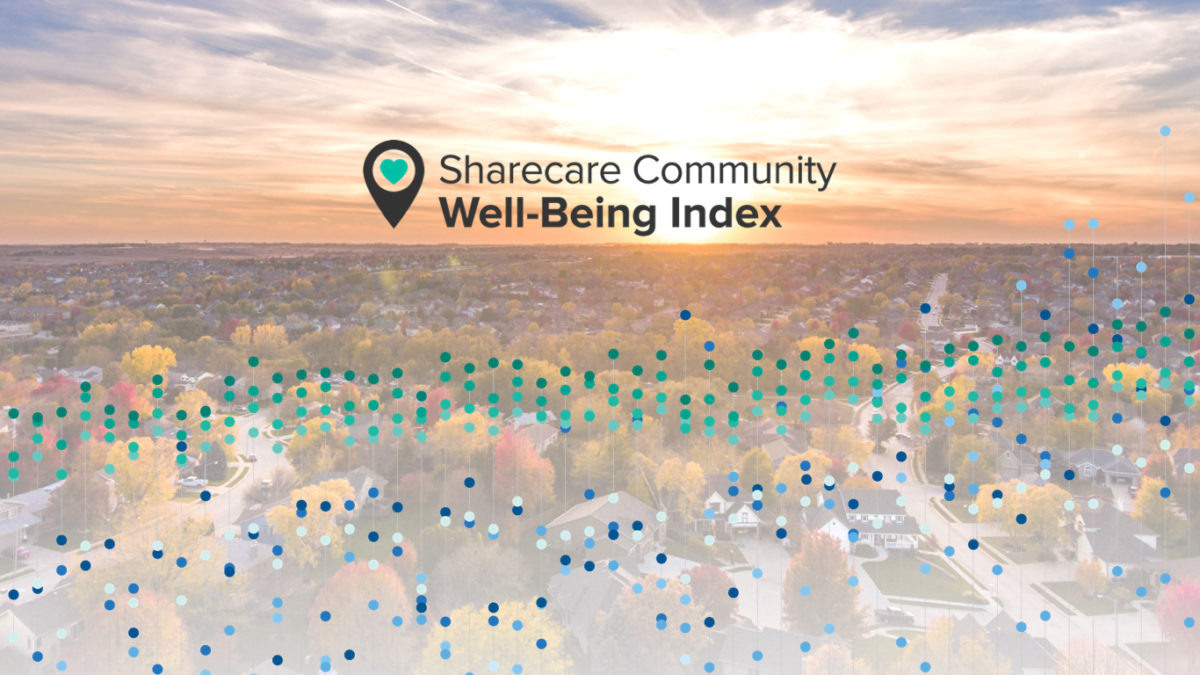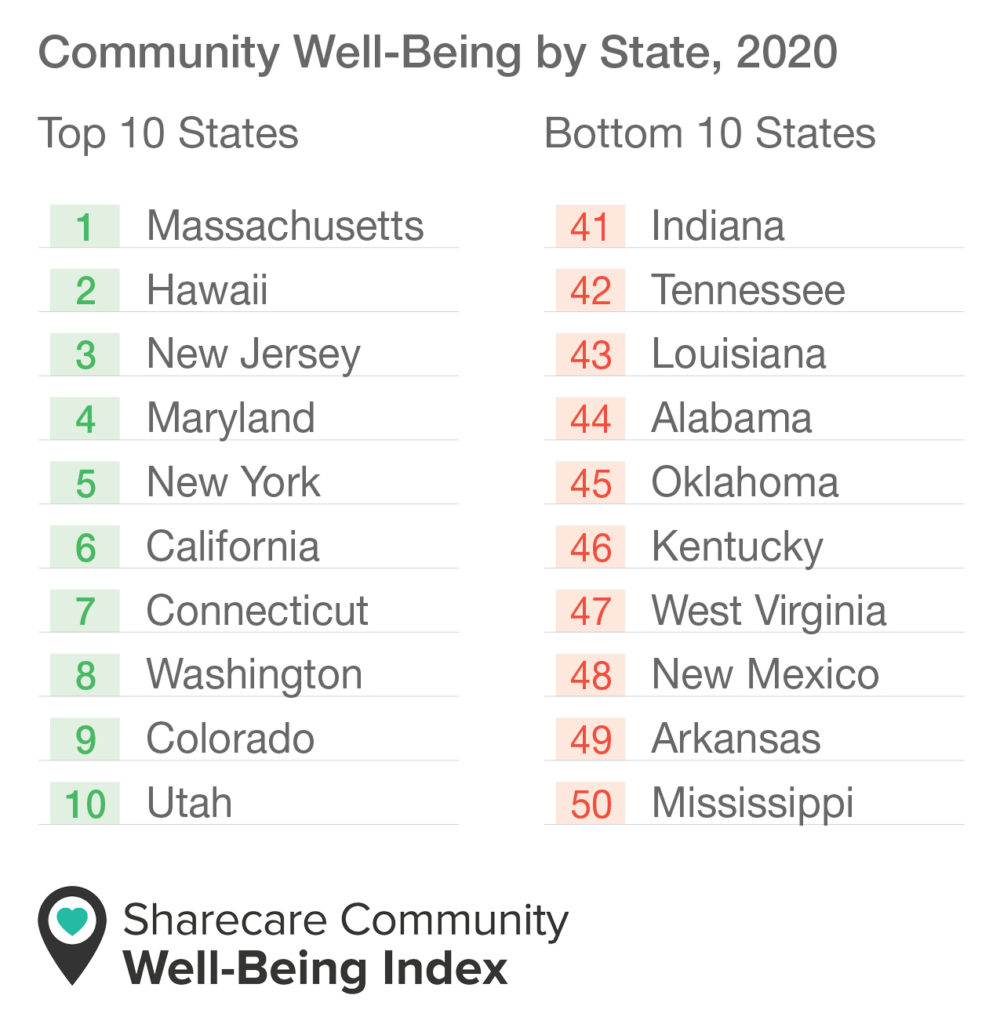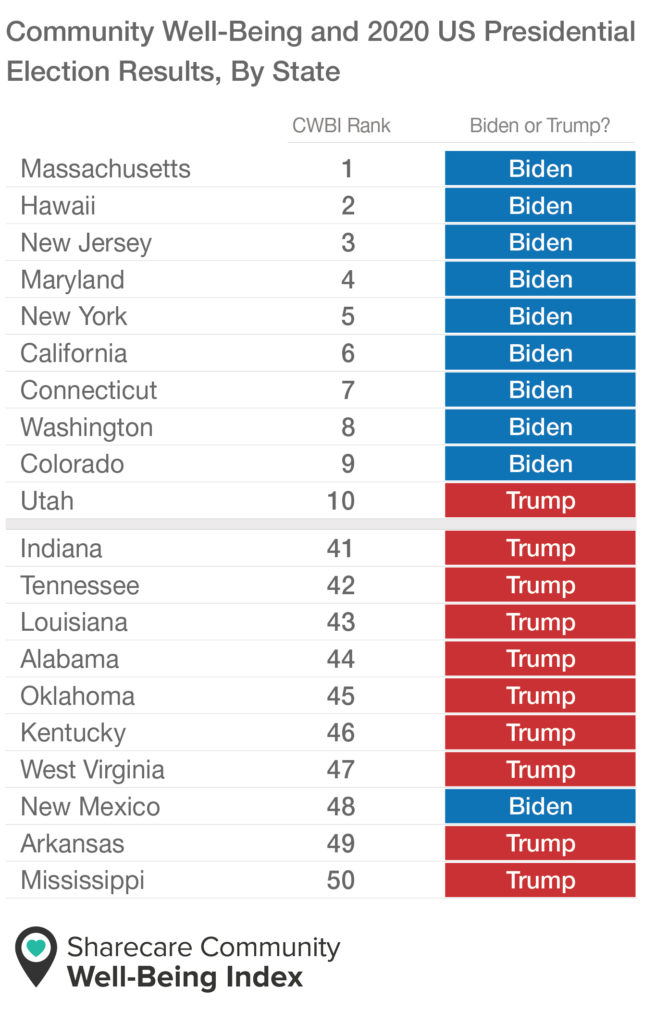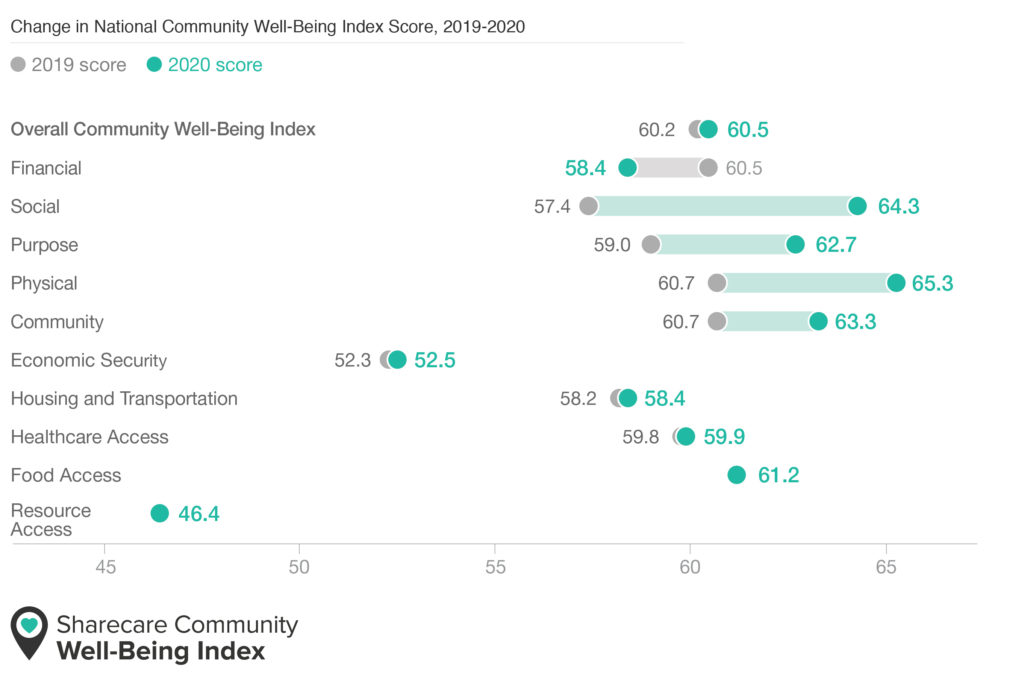Massachusetts ranks healthiest state in US on Sharecare’s Community Well-Being Index as Mississippi sits in last place

Improvements in key well-being measures point to resiliency amid pandemic; best and worst ranked states closely correlate with 2020 presidential election results
ATLANTA – May 25, 2021 – During a year characterized by uncertainty, unrest, and suffering, Massachusetts emerged as the healthiest state in the nation in 2020, according to a report published today by digital health company Sharecare in partnership with the Boston University School of Public Health (BUSPH). The thirteenth generation of Sharecare’s Community Well-Being Index state rankings, this new research reveals that community well-being improved in certain respects in 2020, but significant differences remain across states based on factors such as individual life experiences, availability of key community resources, and more.
Built on more than a decade of measurement and over 3 million surveys completed to-date, the nationally representative dataset comprising Sharecare’s Community Well-Being Index represents the most comprehensive assessment of community health in the country. The 2020 research assessed the well-being of more than 450,000 respondents spanning all 50 states across a range of individual health risk factors – their physical health, community and social bonds, ability to manage their finances to achieve their goals, and strength of purpose in daily life – and analyzed more than 600 elements of social determinants of health to identify those most associated with community health outcomes – healthcare access, food access, resource access, housing and transportation, and economic security.
Massachusetts, Mississippi bookend state rankings
For the first time, Massachusetts ranked No. 1 in the community well-being rankings, followed by Hawaii, a veteran top contender. For the second year in a row, Mississippi took the last position in the rankings, joined by six other Southern states in the bottom 10.
Massachusetts can attribute its strong scores across both social determinants of health and individual health risk factors for its top ranking. The state ranked among the top 10 for eight out of 10 well-being domains — financial well-being (#5), social well-being (#7), purpose well-being (#6), physical well-being (#5), community well-being (#6), housing and transportation (#2), healthcare access (#1), and food access (#7).
Meanwhile, Mississippi ranked among the bottom-performing states on all measures of well-being except resource access (#17).

Best and worst ranked states on Community Well-Being Index closely correlate with 2020 U.S. presidential election results
During a turbulent year that saw political fault lines drive apart the country over economic, social, and public health issues, nine of the top 10 states for community well-being were won by President Joe Biden in the November presidential election, while nine of the bottom 10 states went to former President Donald Trump.
The top nine states – Massachusetts, Hawaii, New Jersey, Maryland, New York, California, Connecticut, Washington, and Colorado – all have populations with generally lower-than-average individual health risk factors and better-than-average social determinants of health. Unlike their bottom-ranked peers, most residents of these states say they enjoy supportive relationships and love in their life; have the tools to manage their economic life to increase financial security and reduce stress, regardless of income; and have access to high-quality healthcare and jobs, on top of their better physical health.

Physical and social well-being increase, financial well-being decreases
Between 2019 and 2020, community well-being across the U.S. remained essentially unchanged, increasing from a score of 60.2 to 60.5, as measured on a scale ranging from 0 (lowest possible well-being) to 100 (highest possible well-being).
Overall community well-being held steady thanks to resilience in key individual health risk factors. Despite including measures of mental health, physical well-being significantly increased over the course of 2020. Positive trends in the strength of Americans’ personal relationships, as measured by social well-being, and other areas of individual health also shielded community well-being.

Notably, financial well-being decreased amid the economic challenges brought on by the pandemic.
“From coronavirus to civic unrest and the fight against systemic racism, 2020 tested our resolve, not only as a country but also as individuals,” said Elizabeth Colyer, senior vice president and head of the Community Well-Being Index at Sharecare. “Despite differing trends noted across states and regions, the latest Index results broadly demonstrate the resilience with which Americans responded to adversity: While financial well-being declined, community well-being held steady with improvements in areas such as physical and social well-being, demonstrating the positive influence that non-physical factors can have on individuals’ health, including the critical impact that outlook and leadership have on our subjective evaluation of health and well-being.”
“This first analysis of 2020 data from Sharecare’s Community Well-Being Index paints an initial picture of the well-being landscape amid one of the most difficult years in recent memory,” said Dr. Kimberly Dukes, executive director of BUSPH’s Biostatistics & Epidemiology Data Analytics Center. “Future investigations will advance our understanding of the distribution of community well-being by uncovering statistically significant trends in counties and metropolitan statistical areas.”
To arrive at these results, Sharecare and BUSPH conducted web and mail surveys with 453,705 U.S. residents aged 18 and older across 2020 and analyzed more than 600 elements of social determinants of health. Results are nationally representative. To read the full report and to learn about the project’s methodology, visit https://wellbeingindex.sharecare.com/reports/.
Later this summer, Sharecare and BUSPH will release 2020 community well-being figures from metropolitan statistical areas and counties as well as a special analysis of community well-being outcomes for BIPOC communities.
About Sharecare
Sharecare is the leading digital health company that helps people – no matter where they are in their health journey – unify and manage all their health in one place. Our comprehensive and data-driven virtual health platform is designed to help people, providers, employers, health plans, government organizations, and communities optimize individual and population-wide well-being by driving positive behavior change. Driven by our philosophy that we are all together better, at Sharecare, we are committed to supporting each individual through the lens of their personal health and making high-quality care more accessible and affordable for everyone. To learn more, visit www.sharecare.com.
About the Boston University School of Public Health
Founded in 1976, the Boston University School of Public Health is one of the top five ranked private schools of public health in the world. It offers master’s- and doctoral-level education in public health. The faculty in six departments conduct policy-changing public health research around the world, with the mission of improving the health of populations—especially the disadvantaged, underserved, and vulnerable—locally and globally.